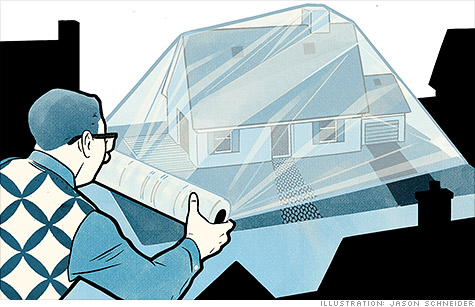
By Josh Garskof
(MONEY Magazine) -- You change your car's oil every 3,000 miles or so, get your teeth cleaned regularly, and
rebalance your investments once a year. So why wouldn't you undertake similar preventive maintenance on your
house?
Having to replace just one of its hardest-working surfaces -- from roofing to exterior paint, hardwood floors to lawn --
would cost you thousands. But you can stave off that pain with simple, often-overlooked upkeep procedures and
slight tweaks to the way you already approach routine chores.
Exterior paint: The biggest controllable threat to the paint on your house is the landscaping around it, says
architect Karen Sweeney, director of facilities for two Frank Lloyd Wright buildings in Chicago.
Overgrown foundation plantings rub away paint -- and bring moisture and bugs onto the finish.
The fix: Prune bushes to keep them at least a foot away from the house; a landscaper might do it for $200 if he's
already there.
Roofing: You can't stop nature from damaging your roof, but you can address the harm coming from within by
adding ventilation to your attic. Without proper airflow, that space can get 35° to 55°F hotter than the outside
temperature, roasting the roof from below.
The fix: Have a contractor add airflow by installing high and low attic vents; they can go in the walls or the roof
itself, depending on the situation ($500 to $1,000).
Hardwood floors: Every grimy boot and dragged chair brings you closer to the day when you'll have to refinish the
floors. "But sanding floorboards makes them a little thinner, bouncier, and creakier," says Sweeney. "And after three
times there's nothing left to sand."
The fix: Hire a floor guy to "screen," or sand away most of the old finish -- without touching the wood -- and apply
new polyurethane ($1,000 to $1,500 for a typical first floor, half the cost of refinishing).
Lawns: Many DIYers and pros do the grass serious harm when they mow.
"People like the look of a close-cropped lawn," says University of Tennessee agriculture professor John Stier, a
consultant to Major League Baseball grounds crews.
But in the North, grass shorter than 2½ to 3½ inches is less drought resistant and invites insects and weeds (in the
South, one inch is fine).
The fix: Set the mower higher and never remove more than a third of the grass height at a time. Says Stier: "Think
of mowing as a trim, not a crewcut."
Comments:
Post Your Comment: